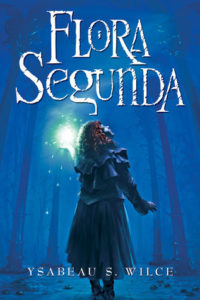
While my return to genre reading over the last few years has been dominated by new releases, it has also involved a fair bit of digging into obscure-but-well-reviewed fantasy from the 2000s—most of it written by women. Such dives have brought me several favorites, like The Lighthouse Duet, The Inda Quartet, and The Long Price Quartet. This year, a Published in the 2000s Bingo square gave me a chance to knock another off the list, so I took a look at the young adult fantasy Flora Segunda by Ysabeau S. Wilce.
Flora Segunda takes place in what appears to be a fantasy version of California, starring a 14 year-old girl left to take care of her magical mansion mostly by herself, with her mother busy leading an army, her father drinking away his PTSD, and the magical butler banished to parts unknown. But one day an elevator with a mind of its own takes her to a new part of the house, starting a chain of events that leads to brand new adventures and more than a little mortal peril.
Though it’s only 16 years old, Flora Segunda feels like it comes from another era of young adult fiction. There’s no dystopia and no love triangle—no romance at all, for that matter—and the protagonist is young enough to lead a middle grade novel in 2023. Instead, there’s magic far beyond the lead’s comprehension and absolute buckets of whimsy. The subtitle—Being the Magickal Mishaps of a Girl of Spirit, Her Glass-Gazing Sidekick, Two Ominous Butlers (One Blue), a House with Eleven Thousand Rooms, and a Red Dog—gives a pretty good indication of how the tone is going to go, and the narrative voice is an absolute delight, with a large vocabulary and plenty of literary allusions combined with some word choices that remind you that the lead is actually a child. So it can reference The Hunting of the Snark and Oppenheimer’s Bhagavad Gita quote on consecutive pages, while in between calling an interlocutor a “snippy snapperhead” and complaining about the state of the potty.
If you’ve a taste for whimsy, it’s worth picking up Flora Segunda for the narration alone. But what about the plot? Well, it’s good, though certainly not the thing that would’ve sold me. As a reader a couple decades past Flora’s age, I mostly looked at her impetuousness thinking “you know that’s going to get you into trouble, right?” And it did! Which is something I appreciate about the book—so many young adult novels feature kids fixing the world because the adults refuse, whereas Flora Segunda mostly features kids getting into trouble by acting rashly on limited information, and then trying to get themselves out of it again. Perhaps it’s not as aspirational, and there are no world-shaking stakes, but it makes for a plenty fun story that feels quite a bit more grounded than a lot of contemporary offerings, despite the magical secondary world.
Another element I loved in Flora Segunda was her relationship with her parents. It’s not great! Her Mom is mostly absent and otherwise pushing her into the family business that she really doesn’t want to go into, and her Dad is a drunk that requires her care more often than the reverse. There were myriad reasons for the story to leave them the genre-typical useless parents that enable their children to go on dangerous adventures. And they certainly were sufficiently neglectful to enable Flora to have dangerous adventures. But the story didn’t stop there. I won’t spoil exactly how it goes, but the ultimate conflict is messier, healthier, and a lot less triumphalist than genre expectations led me to expect.
Overall, Flora Segunda provides a fun adventure for a young teenager who isn’t intimidated by vocabulary. As an adult reader, the adventure is interesting enough, but not really mind-blowing. And yet I will nonetheless shamelessly round my score to five stars because of how much I enjoyed the narrative voice and appreciated reading a young adult book that treated its characters like they still had so much to learn. The story is good, the voice is better, and the way the familial relationships played out was a breath of fresh air. Save-the-world YA has its place—as, I suppose, do dystopias and love triangles—but it was a whole lot of fun to read something different.
Recommended if you like: whimsical fantasy for younger audiences.
Can I use it for Bingo? It’s hard mode for Published in the 00s and Mythical Beasts. It’s also Young Adult, has a Coastal Setting, and there are Angels and/or Demons, though not exactly plot-central.
Overall rating: 17 of Tar Vol’s 20. Five stars on Goodreads.
